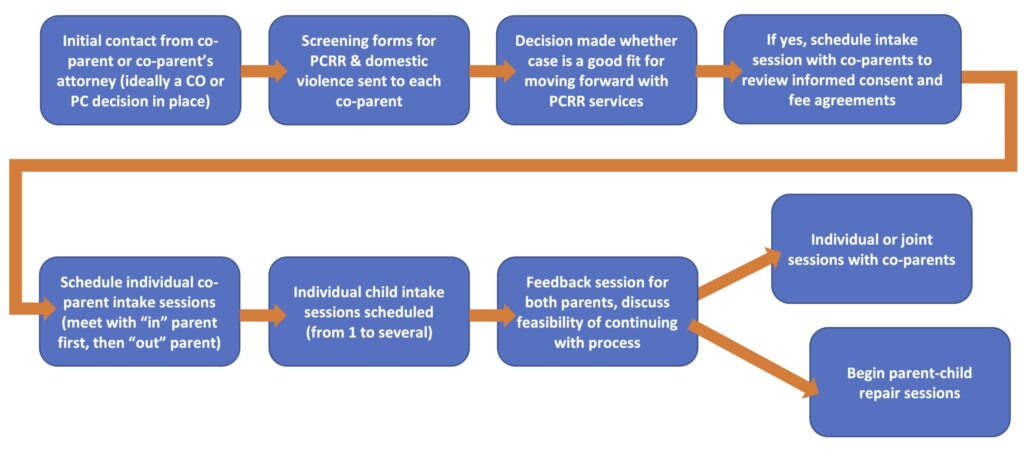The Parent Child Relationship Repair (PCRR) process (aka “reunification therapy”) typically has an initial screening, followed by three phases, although the length and steps of each phase varies from case to case. Note that prior to committing to working with a family, a therapist may require that there be a court order or a parenting consultant (PC) decision that this work will be done. Once this is in place, your therapist may then conduct a screening questionnaire to determine the likely effectiveness of the PCRR process with the family. If it is determined that the process is NOT likely to be effective, the co-parents would be informed and referrals to other providers would be given.
Parent-Child Relationship Repair (PCRR) process

Phase I: Initial Intake & Assessment
This phase typically begins with a meeting with both co-parents, in-person or virtually, to review several key elements of the process – the Agreement & Informed Consent document, the Fee Agreement, possible treatment goals, roles, and expectations, etc. It is helpful for the therapist to have copies of the divorce decree, the custody evaluation report if there is one, psychological evaluations, etc. Following an initial joint meeting, the therapist may then meet individually with each parent and then the child or children. This may be followed with a feedback session with both parents present.
Phase II: Relationship Repair Work
Step 1 – This phase begins by meeting with the “in” parent to address his/her concerns about the “out” parent’s role with the child or children. Often, this involves addressing areas of blame or past resentments, as a lack of acknowledgement of past injustices is often what keeps parents stuck in old cycles of anger and the pointing of fingers. Sessions with the “in” parent continue throughout the process, in parallel with steps 2 and 3, as necessary to achieve the objective of the process.
Step 2 – This phase begins with sessions with the child/children and is done in parallel with Step 1. The goal is to establish trust and for me to gain an understanding behind the resistance or refusal that is taking place. The therapist will also typically meet with the “out” parent to further discuss the child or children’s reasons for resistance and steps this parent can take to address any justified rejection that may be taking place.
Step 3 – With step 3, the child and the “out” parent work directly together. Sessions are used to gradually and incrementally unravel the difficulties that have occurred in the family and resolve them to the point that communication and contact can be restored.
Phase III: Integration
For some families, this phase signals the initiation of parenting time. Other families will have had some schedule of parenting time already in place. The type and frequency of access will vary according to a number of factors. Regardless of what the parenting time looks like, the message sent to the child by the “out” parent is one of caring, interest, and purpose. The message sent to the child by the “in” parent is one of support for the child’s relationship with each parent.
.

Looking for a therapist to provide reunification or PCRR therapy?
While I no longer provide this therapy, I can help you understand the typical process and answer commonly asked questions about providers, pitfalls, and generally what to expect. I can also provide coaching for the either parent – although it is far more common for the rejected parent to seek out this guidance. Note that I also work with attorneys as an expert in this area and can also provide coaching to help parents stuck in these all-too-common situations.